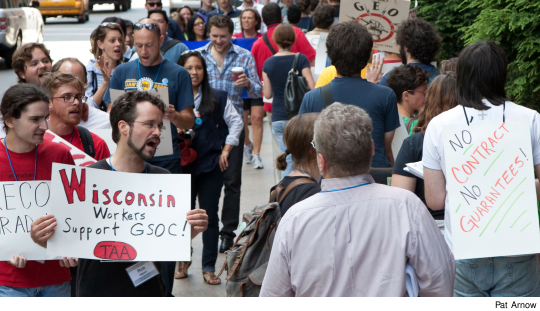 |
Dozens of graduate teaching assistants from around the country rallied outside New York University’s main library on August 11, voicing their support for NYU’s tenacious Graduate Student Organizing Committee (GSOC) and its fight to regain a union contract. NYU has refused to recognize GSOC as a bargaining agent since 2005, but at this protest there was a sense of optimism: the ruling that withdrew legal protection for graduate employee unions at private universities may well be overturned this year.
A decade ago GSOC won the first union contract covering graduate employees at a US private university. But in 2004, the National Labor Relations Board (NLRB) ruled in a case at Brown University that graduate students working as teaching assistants were not employees and thus couldn’t unionize. The Republican-dominated Board held that graduate assistants were not engaged in paid labor. According to the NLRB, graduate employees’ work in the classroom, grading papers, or preparing exams was simply a part of their training as academics – a sort of seminar in college teaching.
RENEWED HOPE
The fact that graduate employees are regularly assigned to teach classes related only marginally – or not at all – to their doctoral studies was largely ignored by the Board, along with many other features of graduate assistants’ working lives. But the makeup of the NLRB has changed under the Obama administration and, this June, Region 2 of the NLRB issued a decision that could lay the foundation for the national board to reverse the Brown decision.
The regional board acted under the precedent set by the Brown decision, and its June decision didn’t reverse it. But its decision tore apart the semi-feudal logic behind the prevailing legal doctrine, paying close attention to exactly the factors that the NLRB had previously dismissed.
REVERSING BROWN
“[B]y separating the services performed from receipt of financial aid, the…record clearly shows that these graduate assistants are performing services under the control and direction of this employer, for which they are compensated,” the regional NLRB decision said.
“Whether through teaching or research,” it continued, “the graduate students are performing services for pay….That the employer pays for these services pursuant to its financial aid budget, instructional budget, operational budget, or through federal grants, is irrelevant to an analysis of employee status or community of interest.”
The year after the Brown decision, NYU withdrew its recognition of GSOC and refused to negotiate a new agreement. If the Brown decision is overturned and a new representation election is held at NYU, GSOC is confident that it will win a solid majority. Activists told Clarion that the school’s graduate students have complained about the lack of dental insurance and the fact that their health care plan was changed with no discussion or advance notice.
“We want to have a say in it,” said David Wachsmuth, who is pursuing a PhD in sociology. And a restructuring of employment at the university has meant that graduate students can’t always secure classes to teach, GSOC members said.
The graduate students rallying on August 11 were in New York City because GSOC hosted a national meeting of the Coalition of Graduate Employee Unions (CGEU), a network of unions representing graduate employees across North America and Puerto Rico. The network includes the Teaching Assistants’ Association (TAA) at the University of Wisconsin, which was at the center of this year’s Wisconsin labor uprising.
There’s a strong basis for “a New York-wide movement of academic labor,” said PSC organizer Sarah Hughes, because academic workers so often change employers, yet still run up against the same conditions. Hughes, who attended the conference, first worked with CGEU as vice president of the Graduate Employee Organization at UMass Amherst.
“A lot of NYU students become adjuncts at CUNY,” she told Clarion – and when faculty at Long Island University went on strike this fall, they appealed to faculty at other schools not to scab on the strike by taking on courses at LIU. “We are all academic workers in higher ed, facing the same struggles,” said Hughes. “Students, adjuncts, junior faculty – we’re all being hurt by the same conservative agenda.”

